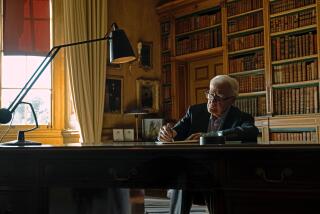The King Is Dead, Long Live George Smiley
- Share via
It took about a millisecond for nostalgia to kick in when word arrived about the death of Sir Alec Guinness, that esteemed, most versatile character actor known in the U.S. mostly for his many movies.
My favorite of those was the 1949 British black comedy “Kind Hearts and Coronets,” in which he drolly played eight members of an upper-crust family targeted by a penniless distant relative determined to murder his way through them, all the way to the family fortune. I could watch it again and again.
But also heading the Guinness legacy is a pair of definitive TV performances that match his best work in any medium and affirm the close kinship of big achievement and the small screen.
Guinness played the same colorless spy chief in each. It was that dogged gray bureaucrat of British espionage, George Smiley, the signature character of John le Carre’s “Tinker, Tailor, Soldier, Spy” and “Smiley’s People” novels, which were serialized by the BBC and sent to the U.S. in the early 1980s.
At their heart was global politics, an open sore of antagonisms and suspicions between the Soviet Union and the West. One man’s festering is another’s fortune, for one result was a thriving industry of Cold War television, from “The Man From U.N.C.L.E.” and “Get Smart” to “The Prisoner” and “The Avengers” as part of a spy genre that the Brits practically invented, its roots going back at least as far as Somerset Maugham.
Typically Le Carre, “Tinker, Tailor, Soldier, Spy” and “Smiley’s People” each portrayed the spy business as grim, unglamorous, James Bond-less, and the British intelligence service as essentially corrupt. No heroic 007s in this shabby crowd, the very best of whom were competent functionaries. The others?
No romantic, Le Carre wrote earlier in “The Spy Who Came In From the Cold” that spies are “a squalid procession of vain fools, traitors, too, yes; pansies, sadists and drunkards, people who play cowboys and Indians to brighten their rotten lives.”
The Smiley that Guinness played in both miniseries suffered them all, driven by a sense of duty to country that he submerged from view.
“Smiley’s People” was merely outstanding, the earlier “Tinker, Tailor, Soldier, Spy”--Le Carre’s first venture into television--occupying a higher stratosphere all its own as one of the very best works of drama ever produced for the small screen, a fictional resonance of scandalous real-life British turncoats Burgess, MacLean, Philby and Blunt.
Central to its success, along with Arthur Hopcraft’s script and John Irvin’s direction, was Guinness, whose work was notable for its economy. Watch him here, and you’re unaware that he’s an actor speaking lines from a teleplay. No seams. Rarely has an actor conveyed so much from within by visibly doing so little. So vividly minimalist is he in my memory as the subtly resourceful Smiley--an ambiguous, faceless operative stripping back layers of duplicity--that I was certain I had written about him for The Times when the six-part “Tinker, Tailor, Soldier, Spy” arrived on PBS. As it turns out, former TV critic Cecil Smith did the anointing:
“It is a remarkable achievement when you realize that the aging, plump, spymaster Smiley displays almost no emotion, listening to all manner of bizarre and bloody circumstances with a face as impassive as a Buddha, occasionally creased by a chilly, noncommittal smile. Only in the eyes behind the thick glasses is there response and reaction--disgust, dismay, triumph and even hurt, as when the occasional crack about Smiley’s flagrantly faithless wife, Lady Ann, gets home.” Guinness, Smith went on, “literally acts with his eyes.”
The philandering upper-class Ann Smiley noted by Smith was played by Sian Phillips in a cast grandly world-class from bottom to top. It also included Ian Richardson as Smiley’s suave best friend, who turned out to be Lady Ann’s lover and the Soviet mole whom Smiley was fetched from retirement to uncover. A master of condescending cads, Richardson went on to appear in some of the best British TV dramas imported to PBS. Pivotal here, too, was the late Ian Bannen as the betrayed agent whose botched spy operation in Czechoslovakia jump-started the Hopcraft teleplay. Years later, the deserving Bannen would earn praise for the lottery-scamming Irish villager he played in “Waking Ned Devine.”
Guinness had a laser eye for detail, nothing illustrating his meticulous approach to “Tinker, Tailor, Soldier, Spy” more than the question he was said to have raised about Le Carre having Smiley habitually wipe his glasses with the fat end of his tie. That would be unlikely, Guinness observed, because London’s cold winters meant that Smiley would be wearing a vest with his suit, making it unnatural for him to fish out his tie to polish his glasses. So a handkerchief had to be substituted.
It seems like yesterday that I was enjoying Guinness in “Tinker, Tailor, Soldier, Spy” for the first time, popping in one cassette after another, wishing there were more than just six. The Cold War was lingering then, giving urgency to the complex thriller on the screen. It’s less the dramatic reconfiguring of global power than the altered tone of today’s television that would probably bar a “Tinker, Tailor, Soldier, Spy” from the small screen today, however. Although I don’t think the Cold War’s absence would dampen my ardor for it, I intend to find out.
After calling around and being told that “Tinker, Tailor, Soldier, Spy” was unavailable on video, I located a copy at the Continental Shop, a Santa Monica video store specializing in British movie and TV titles. That includes “Kind Hearts and Coronets” and “Evensong,” the 1934 movie in which Guinness made his screen debut.
Owner Brian Clewer, who once worked for England’s famed J. Arthur Rank studios, said he orders the videos from London and converts them for usage on VCRs here. That will make my day. The actor who played George Smiley so beautifully is gone, sadly, but the impassive Buddha survives.
More to Read
The complete guide to home viewing
Get Screen Gab for everything about the TV shows and streaming movies everyone’s talking about.
You may occasionally receive promotional content from the Los Angeles Times.






